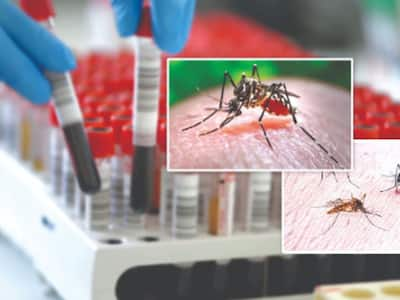
Malaria and Dengue are spreading like forest fire in the country. Here is all you need to know about the two diseases and their distinct signs and symptoms.
Kolkata: Even though dengue cases have been rising sharply, another vector-borne disease is also spreading fast in the city. As per records, most of the hospitals have experienced a sudden surge in admission cases in the last couple of days. While both malaria and dengue are vector-borne diseases and can lead to severe health complications including a sudden drop in platelet counts, authorities are now warning residents to be careful of the signs and symptoms of both illnesses to avert future health complications.
Vector-borne diseases like malaria and dengue which are carried and spread via mosquitoes can be serious, so it is extremely important for everyone to be aware of the symptoms and take precautions to avert the disease from spreading. Scroll down to learn how you can easily differentiate between the two diseases and help your body stay safe.
Understanding The Symptoms of Malaria and Dengue
While dengue is caused by Aedes aegypti, malaria is caused by an infected Anopheles mosquito. It is crucial to see a doctor if you experience any of the following symptoms because signs can tell you about the onset of dengue and malaria. Some of the common signs of both the conditions are:
- Fever accompanied by muscle pain
- Headache
- Joint Pain
- Skin issues like rashes
- Unexplained weight loss
- Loss of appetite
- Nausea and diarrhoea
Anaemia, sweating, and chills are other symptoms of malaria. Gum or nasal bleeding may result from dengue.
Malaria Vs Dengue: How To Differentiate Between The Two?
While dengue and malaria have some similar symptoms, there are also some key distinctions. Here, we discuss these illnesses in more detail and explain how to determine whether dengue or malaria is to blame for your fever.
The potentially fatal plasmodium parasites that cause malaria are spread via the bite of female Anopheles mosquitoes carrying the disease. Dengue, however, is a far more dangerous condition. It is a viral illness spread by female mosquitoes, primarily those of the Aedes aegypti species.
The dengue virus typically only causes a mild flu-like sickness. But infrequently, this can lead to a potentially fatal complication known as dengue hemorrhagic fever.
Your white blood cell and platelet count would decrease from 1.5-4 lakhs to as low as 20,000 40,000 as a result of dengue fever.
READ RELATED: High Cholesterol Causes: 7 Unusual Things That Can Raise Your Bad Cholesterol Levels
Some of the distinct signs of malaria that stand out when compared to dengue infection are:
Malaria
Malaria symptoms usually appear 10 to 15 days post the infective mosquito bite. Some of the signs of this include:
- Extreme fever
- Body pain
- Severe to very severe chills
- A drop in body temperature that causes profuse perspiration
- Headaches
- Nausea
- Vomiting
- Diarrhoea
Dengue
After an incubation period of 4 10 days following the bite by an infected mosquito, symptoms typically last for 2 7 days. When a high fever (40 C/104 F) is present along with two of the symptoms listed below, dengue should be suspected.
- A chronic headache
- Pain behind the eyes
- Fever accompanied by joint and muscle discomfort
- Nausea and vomiting
- Enlarged glands
- Skin rashes
Caution: Do not self-medicate. Always get yourself checked by a doctor to ensure timely medical intervention and proper treatment.
Total Wellness is now just a click away.
Follow us on
Don’t Miss Out on the Latest Updates.
Subscribe to Our Newsletter Today!
window.addEventListener(‘load’, (event) => {
$(‘#commentbtn’).on(“click”,function(){
(function(d, s, id) { var js, fjs = d.getElementsByTagName(s)[0]; if (d.getElementById(id)) return; js = d.createElement(s); js.id = id; js.src = “//connect.facebook.net/en_US/sdk.js#xfbml=1&version=v2.3”; fjs.parentNode.insertBefore(js, fjs);}(document, ‘script’, ‘facebook-jssdk’));
$(“.cmntbox”).toggle();
});
});






